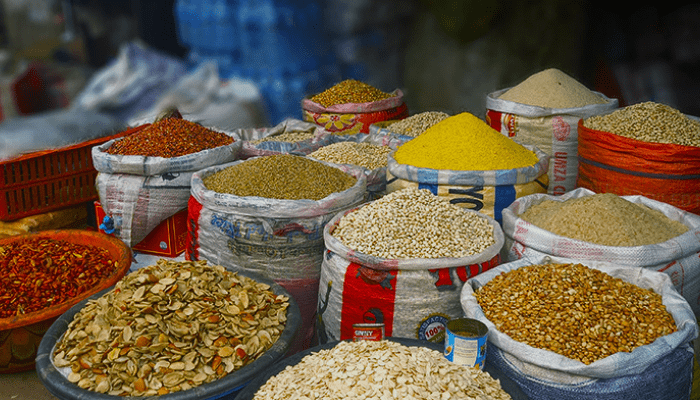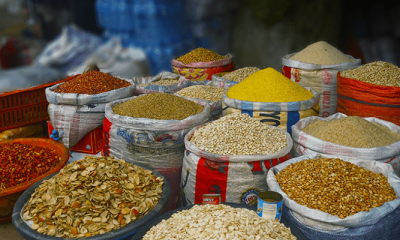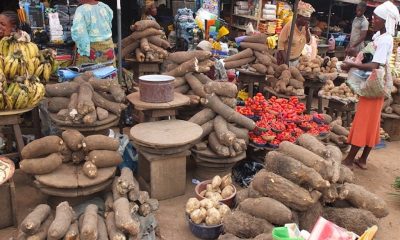Business
Why Food Prices Are Dropping In Northeast
By Benjamin Abioye

As the Muslim holy month of Ramadan approaches, food prices have dropped sharply in Nigeria’s Northeast region, an area that has suffered from years of insurgency.
The price drop is mainly due to a bumper harvest in states like Taraba, Borno, Adamawa, and Yobe. Farmers have harvested a variety of crops, including onions, peppers, maize, rice, yam, potatoes, beans, cassava, and millet.
Market surveys show that several factors contributed to the decrease in food prices, including limited cash circulation. Traders and farmers are eager to sell their produce to buy necessary items for Ramadan.
Reports in Nigerian news media indicate that the support provided by state governments played a role in this year’s bumper harvest. In Borno State, Governor Babagana Zulum helped farmers by offering free transportation, security through agro-ranger squads, and farm inputs. Similarly, Yobe State Governor Mai Mala Buni invested in agricultural development by providing tractors and farming inputs.
Abdulmumini Gulani, a socialist, praised the Federal Government for reducing economic hardship. He observed, “It’s noted that here in Yobe State, food prices have decreased by almost 30% as the prices of beans, sorghum, millet, and maize are now falling. Others like pepper, onion, and other perishable foods have also seen a significant price drop.”
Gulani also pointed out that Nigeria’s economic situation, including cash scarcity, may be influencing food prices. However, he noted that seasonal changes, local production, and global market trends also play a key role.
“For this reason, we must commend the administration under the leadership of President Bola Ahmed Tinubu for his efforts to make life affordable. It’s hoped that the government will look into the issue of the removal of fuel subsidies,” he said.
In Yobe’s Potiskum cereal market, millet now sells for N60,000, down from N80,000. White beans (50kg) cost N55,000, while a 100kg bag is N87,000. Red beans, previously N120,000, now sell for N90,000. Peanuts dropped from N210,000 last year to N130,000.
In Damboa, farmer Ali Baba noted that the price of maize (100kg) has fallen from N54,000 to N40,000, soybeans from N40,000 to N32,000, and sorghum from N50,000 to N41,000. He added, “Most of those hoarding grains fear prices may drop further, so they are rushing to sell their stock.”
Abubakar Kois, a trader in Maiduguri Market, attributed the price drop to the absence of middlemen. He explained, “At the local market now, prices of grains like maize and beans are gradually coming down. Before, we relied on middlemen, but now we go directly to farmers in weekly markets, which is helping lower prices.”
In Adamawa, market prices remain unstable. While some food prices have fallen, others continue to rise. Traders at Jimeta Modern Market in Yola reported that staple foods like maize, rice, guinea corn, and beans have dropped significantly.
A trader named “Yellow” said he invested ten million naira in grains but has been unable to sell due to falling prices. He is now buying more goods at lower prices to avoid losses.
In late 2024, a bag of maize sold for N60,000 to N65,000. By early 2025, it dropped to N50,000 or N53,000. Last year, those who stored grains made huge profits, but this year the situation is different.
Ganye Yam Market in Adamawa is a key trading hub, attracting buyers from across Nigeria. Previously, 100 tubers of yam cost N70,000 to N80,000, but now the price has surged to N200,000. A small tuber that once sold for N500 to N1,000 now costs between N1,000 and N2,000.
Adamawa also has large cattle markets in Ngurore, Mubi, Cigari, and Ganye, where over 5,000 cattle are sold on market days. Three years ago, a cow cost N300,000 to N400,000, but now prices range from N700,000 to over N1 million.
Governor Ahmadu Umaru Fintiri has launched agricultural initiatives to boost food security. The state’s Agricultural Programme for Poverty Alleviation and Climate Change Adaptation (APPACCA) aims to enhance food production. The government has also expanded farmland for cultivation.
Professor Ahmad Bawa of Moddibo Adama University believes food prices are influenced by the federal government’s policies on food importation. He noted, “The possibility of a price hike on food is minimal, and any government initiative on food security is commendable.”
In Taraba’s capital, Jalingo, demand for food items has surged as prices drop. A bag of millet, previously N75,000, now sells for N60,000. Beans have dropped from N150,000 to N120,000, sorghum from N65,000 to N45,000, and onions from N220,000 to N70,000.
Despite the drop in food prices, farmers are struggling with rising fertilizer costs. Mallam Hassan Wakili, former chairman of the rice association in Zabrmari, noted that fertilizer prices have increased.
He said, “Fertilizer dealers in Maiduguri have raised prices. One brand has gone from N20,000 to N25,000, while another now sells for N50,000 to N52,000. Many farmers cannot afford fertilizers, and the government must step in to subsidize farm inputs.”
With Ramadan approaching, the hope is that food prices will remain affordable, allowing people to stock up on essentials. However, concerns about fluctuating prices, middlemen activities, and the high cost of farming inputs remain. The government’s intervention will be crucial in maintaining food security in the region.
Send Us A Press Statement Advertise With Us Contact Us
And For More Nigerian News Visit GWG.NG





